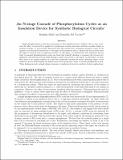An N-stage Cascade of Phosphorylation Cycles as an Insulation Device for Synthetic Biological Circuits
Author(s)
Shah, Rushina; Del Vecchio, Domitilla
DownloadExtended version of ECC 2016 paper (657.6Kb)
Terms of use
Metadata
Show full item recordAbstract
Single phosphorylation cycles have been found to have insulation device abilities, that is, they attenuate the effect of retroactivity applied by downstream systems and hence facilitate modular design in synthetic biology. It was recently discovered that this retroactivity attenuation property comes at the expense of an increased retroactivity to the input of the insulation device, wherein the device slows down the signal it receives from its upstream system. In this paper, we demonstrate that insulation devices built of cascaded phosphorylation cycles can break this tradeoff allowing to attenuate the retroactivity applied by downstream systems while keeping a small retroactivity to the input. In particular, we show that there is an optimal number of cycles that maximally extends the linear operating region of the insulation device while keeping the desired retroactivity properties, when a common phosphatase is used. These findings provide optimal design strategies of insulation devices for synthetic biology applications.
Date issued
2016-03-27Keywords
synthetic biology, modularity, retroactivity, insulation, phosphorylation, covalent modification, cascades
Collections
The following license files are associated with this item: